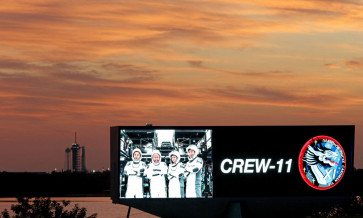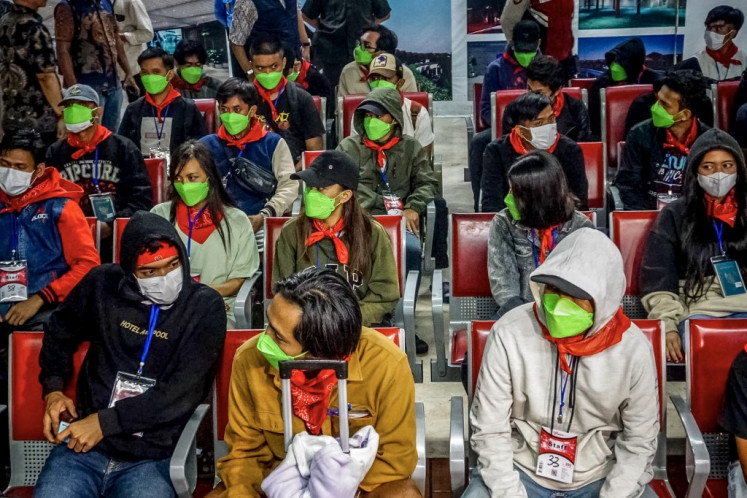Popular Reads
Top Results
Can't find what you're looking for?
View all search resultsPopular Reads
Top Results
Can't find what you're looking for?
View all search resultsHalal certification yes, commercialization no
Commercializing halal licenses is nothing new, but it is worth noting the recent, shocking revelations in an Indonesian weekly that point to the practice involving elements of the Indonesian Ulema Council (MUI)
Change text size
Gift Premium Articles
to Anyone
C
ommercializing halal licenses is nothing new, but it is worth noting the recent, shocking revelations in an Indonesian weekly that point to the practice involving elements of the Indonesian Ulema Council (MUI). The report was based on evidence and field observations.
The case also attracted the attention of the Australian media. The Australian daily, for instance, which reported this issue on Feb. 24 in a story titled 'Australia caught in 'cash-for-halal' claim'', said that Australian groups seeking halal certification had to pay large 'donations' to the MUI.
It also reported that several halal certification authorities and businessmen in Australia faced complicated procedures and difficulties in obtaining halal licenses despite the fact they agreed with the 'terms and conditions'.
The investigative report has stunned many because the MUI is a religious institution, comprising highly respected ulema that are considered tafaqquh fid diin (masters of religious teachings) and Muslim intellectuals.
What is the lesson learned from this case? The case could damage the reputation and credibility of the MUI as a religious authority. The MUI is widely regarded as a noted religious institution, although it is also popularly known for issuing conservative and controversial fatwas.
However, ordinary Muslims still perceive the MUI as the most authoritative body to issue a religious fatwa. To a certain level, the issuance of halal licenses is also related to fatwas regarding halal and haram food, drink, cosmetic products and others.
Indeed, so far the MUI claims to be the only institution mandated and religiously justified to issue halal licenses in the country. Such a claim does make sense as the MUI groups together representatives of various Islamic organizations in Indonesia and it has secured legitimacy from the government.
The MUI also claims it has 'comparative advantage' and modern technology in processing and issuing halal licenses, particularly related to procedures, processes, methods, fatwas and halal certification issuances.
Hence, the roles of the Food and Drug Analysis Agency (LPPOM), the MUI and the Fatwa Commission are crucial and influential in determining whether local or international products can be classified as halal or haram for consumption by Muslims. The MUI is proud that its mandate has been approved by the Indonesian people and recognized internationally.
In fact, issuing halal certificates is not about being religious per se, but as in the case of MUI, it has something to do with money.
It means that those wanting to obtain halal certification for selling or importing products in Indonesia must deal with the MUI.
The MUI claims to have standard operating procedures (SOP) that include cheap, fast and transparent processes. As stated by MUI deputy chairman Amidhan, 'halal certification is a part of da'wah [Islamic missionary] and it is nonprofit'.
All Muslims are committed to consuming halal products as a crucial element of Islamic law. Hence, Muslims need halal certification to engage with their religious obligations. This is because Muslims are obliged to eat and drink halal and thoyyib (wholesome) foods simultaneously (Q.S. Al Baqarah 168). It means that beside eating and drinking permissible products, all Muslims must be committed to consume good, safe, fit and religiously justified products. It aims to purify the body and spirituality of human beings. That's why Muslims are generally pleased to support halal
certification.
The problem lies in the fact that halal certification, as stated by S. Romi Mukherjee in his article 'Global Market: Meat, Money and Religion', is also related to economic orientation, particularly due to its relation with increasing demand and the rise of the 'global market'. Thus, halal certification also constitutes 'business' due to the huge amount of money involved and benefits of this effort. Consequently, it is vulnerable to the rise of commercialization and conflict of interests among Islamic institutions.
Some have criticized the MUI for holding a 'monopoly' on issuing halal certification. To counter such a monopoly, Nahdlatul Ulama (NU), the country's largest Muslim organization, established NU's Halal Agency (BHNU) in early February 2013. Meanwhile, the government has also submitted a draft of a bill on halal products to the House of Representatives.
There are several sticking points in the debate of the bill. One of them is the government's proposal for the establishment of a national institution to protect halal products. If the House endorses this new institution, the MUI's monopoly will be over. So far, the MUI has fought the move and is defending its right as the only institution mandated to issue halal certification.
With regard to the new institution, the Indonesian government is emulating the Halal Industry Development Cooperation (HIDC) in Malaysia. Established in April 2008, the main role of the HIDC is to handle the local and international halal certification process.
The HIDC is fully owned by the Malaysian government. It took over the authority of the Department of Islamic Development Malaysia (JAKIM) in maintaining the halal certification process.
The aim of the HIDC is 'to create better coordination, to increase efficiency and transparency and to avoid international confusion regarding the halal certification process'.
Learning from the 'halal for cash' case and the need to 'reform' the halal license monopoly, any institution that deals with halal labeling requires strict oversight from an independent and credible institution to avoid commercialization and gratuity practices.
The case involving the MUI concerns the issue of ethics due to the fact that it receives funds from the state budget, albeit only Rp 3 billion (US$257,124) per year.
Without supervision, halal certification is prone to commercialization. So, say no to commercialization because it leads to gratuities, which run counter to Islamic teachings.
__________________
The writer is a visiting associate professor at the School of International Studies (SoIS), Universiti Utara Malaysia (UUM), Kedah, Malaysia.










